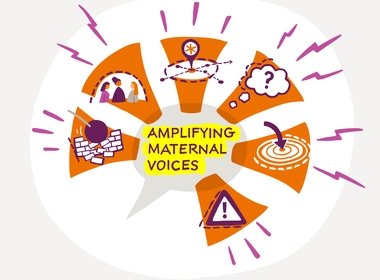This section of the Amplifying Maternal Voices Toolkit explores how to share stories about perinatal mental health in a safe way. Ideas here may be useful to local groups engaging those with lived/living experience, as well as for people with lived/living experience wanting to tell their stories in a safe way with an emphasis on self-care.
[I share my story] to raise awareness of maternal mental illness and reduce stigma by talking openly about my experience.
Maria, MMHA Lived Experience Champion
The following themes came up in various conversations and sessions with MMHA lived experience champions, local contacts and members:

“When I initially decided to share my story it was because I had just recovered and was reflecting back on my experience. I had no knowledge of perinatal mental illness and not a lot of knowledge on mental illness as I had no experience of it from either myself or anyone I knew. I couldn’t believe I had been so naive and felt strongly that more awareness needed raising and more people needed to know.
"Now, years later, it’s still very much the same reason I share it, and why I’ve become so involved in working to create change within the sector. So many mums I speak to are so scared to reach out for support but don’t think twice before asking for support with their physical health.
"I believe the way to make this easier is to share our stories so they know they aren’t alone and feel empowered to know support is out there and that there is the hope that they will get better. Lived experience is so key to getting that point across and I know when I’ve spoken at many events they have commented on how it is the lived experience talk that is the most impactful and why it’s so important to me that I keep doing them.”
“The groups were initiated through conversations with minoritised staff, reflecting on how to ensure learning on issues of race, while protecting minoritised staff from the secondary trauma this can cause.
"We created monthly reading groups (one for white staff and one for staff from minoritised ethnic backgrounds) that used the book ‘Me and White Supremacy’ a guided journal by Layla F. Saad on practitioners’ cultural competence and awareness.
"The goals were to increase all psychology clinicians’ awareness of the disparity and disadvantages faced by women of minority ethnic backgrounds. Further, to begin conversations and reflections which could increase cultural competence and subsequently clinicians’ confidence working with difference and diversity in their work. For our white clinicians we aimed to increase their ability to recognise their own privilege and biases when working with different cultures. For our minoritised staff group we hoped to create a supportive and safe space for non-white clinicians to discuss diversity issues, intersectionality and the impact of racism on their experiences.
"The group had a positive impact on willingness to engage and ethno-cultural empathy. The group was a safe space to discuss race and difference, created a sense of ownership and improved understanding of white privilege and its consequences and a better language to understand and discuss this. Staff wanted this work to continue, specifically: considering clinical implications of this learning. New groups have begun to examine cultural parenting and motherhood traditions, as well as case reflections.”
Dr Elizabeth Penny, Birmingham and Solihull Mental Health NHS Foundation
It's important to offer pseudonyms, anonymity and raise the issue of future proofing before sharing someone's story. Here are some MMHA champion story examples:
Never forget, you are doing a brave and generous thing, and people are rooting for you!
Abi, MMHA Lived Experience Champion
There are different ways to share your story, or someone else's. Hear two MMHA Champions share their experience through audio:

Chrissy joined the Roche podcast team to discuss maternal mental health, signs and symptoms, stigma, and how to support colleagues.

In this series of audio clips, Fatima shares her experience of maternal mental illness as a newly single mother seeking asylum.
Video can be a powerful way to share stories. All you really need is a phone to get started.
If the content of these videos causes you to think of anything that has happened to you or someone you know and you feel upset, worried or uncomfortable, please see our support page for a list of services who may be able to help.
“Think about the audience and who might be in it. I’ve given my talk so many times and been completely unaffected but one time a health professional I had a bad experience with was in the audience. Afterwards this affected me as I felt like I had exposed myself and made myself vulnerable. I didn’t regret speaking but wished I had given it some thought beforehand to how it might make me feel.” Leanne, MMHA Lived Experience Champion
“Before an event I spend some quiet time thinking about what I’m happy to share that day. This may differ depending on other things happening in my life at any given moment.” Maria, MMHA Lived Experience Champion
“I tend to feel pleased that out of my illness and suffering I have done something productive and hopefully beneficial to others. Sometimes I feel quite tired or even a bit raw afterwards, but I’ve never wished I hadn’t done it.” Abi, MMHA Lived Experience Champion
Hearing/absorbing challenging content can be difficult.
Take time to reflect as needed. Ask the person sharing their story how they would like to be supported. Everyone has different needs, so provide a number of choices, such as:
Please note the MMHA is not responsible for the content of external sites.
Explore the other sections, or head back to the Toolkit landing page.
This section is split into two, looking at examples of the barriers women and families may face to both accessing perinatal mental health services and to local involvement in groups and organisations.
Understand how groups and organisations can demonstrate the impact of local initiatives. Ideas here may be useful for those seeking funding or to highlight gaps in current perinatal mental health services.
Explore ways to connect with local organisations and advocate for positive changes in perinatal mental health services. Find examples and ideas for local groups and individuals looking to collaborate and influence their local landscape.

This toolkit offers creative ideas and practical tools to empower individuals in shaping perinatal mental health care at the local level.